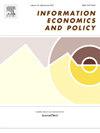双寡头市场的内生目标模型
IF 3.2
3区 经济学
Q1 ECONOMICS
引用次数: 0
摘要
本文研究了双头垄断中定向广告的福利效应。为此,本文提出了一个博弈论模型,在该模型中,企业可以对其定位技术进行昂贵的投资。结果表明,事前相同的企业在技术博弈的每一个纯战略均衡中都使用不同的技术。如果企业的目标群体是同一群消费者,那么低技术含量的企业可以通过使用更好的技术来增加整体福利。然而,由于企业之间的竞争加剧,这导致行业利润下降。本文章由计算机程序翻译,如有差异,请以英文原文为准。
A model of endogenous targeting in duopoly
The paper investigates welfare effects of targeted advertising in a duopoly. To this end, a game-theoretical model is proposed in which firms can make costly investments in their targeting technology. It can be shown that ex ante identical firms use different technologies in every pure-strategy equilibrium of the technology game. If firms target the same group of consumers, the low-technology firm could increase overall welfare by using a better technology. However, this leads to lower industry profits due to tougher competition among firms.
求助全文
通过发布文献求助,成功后即可免费获取论文全文。
去求助
来源期刊

Information Economics and Policy
ECONOMICS-
CiteScore
5.00
自引率
10.70%
发文量
27
期刊介绍:
IEP is an international journal that aims to publish peer-reviewed policy-oriented research about the production, distribution and use of information, including these subjects: the economics of the telecommunications, mass media, and other information industries, the economics of innovation and intellectual property, the role of information in economic development, and the role of information and information technology in the functioning of markets. The purpose of the journal is to provide an interdisciplinary and international forum for theoretical and empirical research that addresses the needs of other researchers, government, and professionals who are involved in the policy-making process. IEP publishes research papers, short contributions, and surveys.
 求助内容:
求助内容: 应助结果提醒方式:
应助结果提醒方式:


